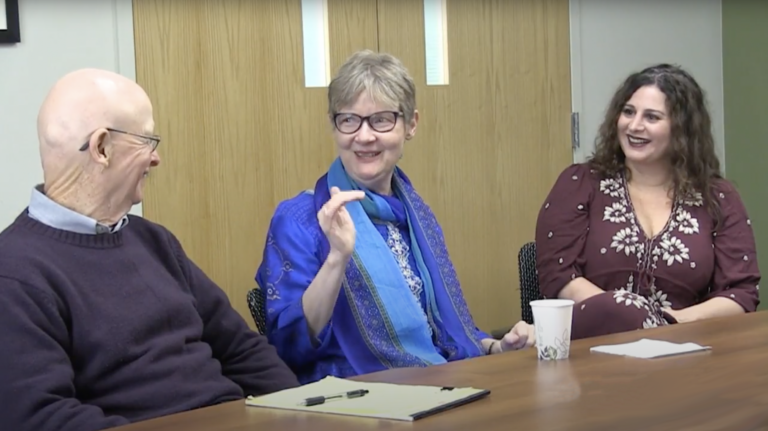Constance Sheerr Kittner Conversation Cafes (Virtual)
The Aphasia Center's 'Connie's' Conversation Cafes provide members with the opportunity to have their voices heard in a supportive environment. Adult conversation and social interaction are encouraged, with all group members practicing the use of successful communication strategies. Members share “recipes for success” for coping with aphasia and enjoying life. Connie’s Cafes welcome open enrollment and run in 10-week seasonal semesters (note: summer session is abbreviated). All groups are held virtually with occasional hybrid sessions. Group placement is determined by a speech language pathologist, based on the individual’s language level. Sessions are led by an SLP to provide techniques to extend effective communication strategies. There is a nominal fee to participate each seasonal semester. Limited scholarships are available.
Mondays, 11am
Tuesdays, 11am or 2:15pm
Talking Book Club (Virtual)
The Aphasia Center's Talking Book Club is open to those who miss the pleasure of reading and/or would like to boost their reading skills. Each semester, the group selects the next semester's book to 'read' (traditionally and/or on tape as preferred). We meet weekly to discuss designated chapters until the book is complete. Our books span a variety of genres and themes. The Aphasia Center is happy to help members register for free audiobook services offered through the Library of Congress’ National Library Service. Sessions are led by an SLP to provide techniques to extend effective communication and comprehension strategies. There is a nominal fee to participate each seasonal semester. Limited scholarships are available.
Mondays, 12:30-1:30pm
Reta's Games Groups Presents: Virtual Variety Hour (Virtual)
The Aphasia Center offers a weekly virtual variety hour to provide members with the opportunity for social interaction, use communication skills and enhance strategy while having fun doing things like playing word games, taking virtual field trips, listening to music, and more! There is no charge for Virtual Variety Hour.
Wednesdays, 11am-12pm
Education Programs (Both Virtual or In Person)
Most people don't hear the word “aphasia” until someone they know is touched by this disorder. As a result, people with aphasia, their families and friends have a lot of questions about living with this condition. The Aphasia Center organizes quarterly education programs on a wide variety of topics. We cover a wide range of topics that reveal how to thrive with aphasia. Education programs are hybrid and open to the public. There is no charge for Education Programs.
Quarterly
Aphasia Blog and Virtual Resource Library (Virtual)
Our blog is a resource for people with aphasia and co-survivors, as well as for clinicians and students. Resources are available at no charge.
Online, 24/7
Advanced Clinical Therapy Program (In Person)
The Aphasia Center offers individualized Advanced Clinical Therapy Program, which is a specialized outpatient program, developed for people with chronic/persistent or progressive aphasia. Aphasia Center clinicians have access to the very latest research, often conducted on campus at the Moss Rehabilitation Research Institute (MRRI). Each individual undergoes a comprehensive assessment using standard aphasia tests and specialized tests developed by researchers at MRRI and other research facilities. The clinicians use this cutting edge research and computer technology to design a program for each individual that emphasizes effective home practice routines using computers whenever possible. To qualify for the ACT program, the individual with aphasia must be at least six months post-onset of chronic aphasia or have a diagnosis of primary progressive aphasia. Prior to admission, an Aphasia Center clinician may request a prescreening interview and/or review of medical and therapy records to determine eligibility for additional treatment. Eligible patients participate in therapy two to three times a week. There is a participation fee.
By appointment only
Primary Progressive Aphasia (PPA) Conversation Cafe (Virtual)
The Aphasia Center offers specialized conversation groups specifically for people diagnosed with PPA. Sessions are led by an SLP to provide techniques to extend effective communication strategies and provide an understanding space for people living with PPA to engage in conversation. There is a nominal fee to participate each seasonal semester. Limited scholarships are available.
Tuesdays, 1pm
Care Partner Support Group for People Living with Primary Progressive Aphasia (Virtual)
This peer led support group provides an insulated outlet for people who are caring for loved ones living with Primary Progressive Aphasia. Care partner peers meet during the same hour that their loved ones are engaged in their PPA Support Group. There is no charge for the support group.
Tuesdays, 1pm

